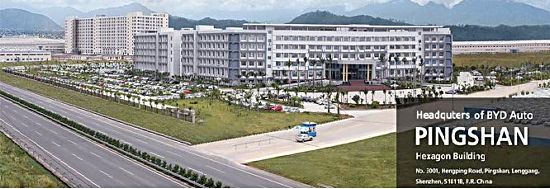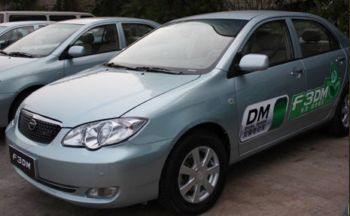
JUNE 17 was an important day for the alternative fuel vehicle industry in China. It marked the Communications Ministry’s release of the “Regulations of New Energy Vehicle Sector,” with the new provisions officially launched on July 1.
As a pioneer in China’s alternative energy vehicle sector, BYD (in which Warren Buffett owns a 10% stake) will be greatly impacted by these new developments.
The Shenzhen-based rechargeable battery and vehicle manufacturer said the new regulations are very important for the industry.
Firstly, they are an affirmation by the central government that the sector is of crucial importance to the country’s overall economic development. Also, they give a “green light” for further growth in China’s renewable fuel vehicle market.
One of the biggest differences between current policy toward the sector and that after the July 1 implementation is the newly enhanced level of difficulty in reaching “market threshold” status for authorization given to products looking to enter the broader supply chain or domestic auto showrooms.
By putting in place clearly defined market entry thresholds, established players like BYD will not only likely rev up their own market share, but also leave inefficient upstarts and copycats in the dust.
However, this does not mean Hong Kong-listed BYD will not face its share of bumps in the road.
One veteran observer of the alternative fuel vehicle market said BYD essentially had three stumbling blocks to maneuver around.
Lukewarm reception to lithium ion batteries
There have been some delays and muted disputes with the formulation and execution of the new policy, especially when dealing with the intricate cross-departmental and inter-industry coordination that must be realized between all the intricate players in automaking – from chassis, to electricians, to welders and battery fitters, all the way to painters at the end of the assembly line.
The level of communication and cooperation at all stages of production to ensure compliance with the regulations demands new modes of thinking on the factory floor.
And when we asked which stage had BYD’s F3DM model reached -- a car that was already being sold in showrooms nationwide -- an official from the company said it was “somewhat distant” from meeting the newly implemented industry regulations, but was unwilling to elaborate.
He did add that since BYD had first entered the vehicle market, it had consistently relied heavily on its traditional strength in rechargeable battery technology to get a pole position vis-à-vis its rivals in the sector.
Therefore it was seeing a return on its massive investment in car batteries and complete vehicles. Its first hybrid fuel vehicle – F3DM – hit the streets in December of last year, and already has rallied to its cause a growing list of group clients, while the company is committed to further penetrating individual auto-buying market in China.
Another industry insider said this time, BYD may have put too many eggs in the traditional lithium-phosphate battery, whereas what the new regulations are calling for is a pure lithium-ion battery, which is still closer to production stage than completion for BYD. But they are getting there.
This could mean BYD may slow or shelve further development of the existing F3DM to allow it to catch up with the new regulations.
And as for those eyeing a year-end launch of the purely-electric E6 vehicle from BYD, its more traditional self-developed iron-oxide battery will be subject as well to the newly launched tighter restrictions.
Those hybrid models that use lead acetate batteries, purely electric private-use vehicles, purely electric commercial vehicles and even those hybrids using nickel-oxide power cells are the major beneficiaries of the new rules, and should increasingly become mature products over time.
Government support lacking, BYD seeking breakthrough
In April, BYD did not attend a major powwow between government and industry leaders – an event which saw two important production and development deals signed between Nissan Motors, the Ministry of Communications, and the Wuhan city government.
The contract involved auto battery recharging network services being provided by the Ministry in and around the city using a lot of the Japanese automaker’s technology. This would help support Nissan’s plans to launch electric vehicle production in the central Chinese city by 2011.
For whatever reason, BYD’s absence from the meetings could not have helped it cause.
But despite the company’s apparent lack of interest in developing operations in Wuhan, it is nevertheless enjoying a very productive relationship with its home-base municipal government of Shenzhen.

e F3DM model from BYD: World’s first new energy vehicle independent of a specialized electric charging station.
When the F3DM went to market last year, the Shenzhen city government and major lender China Construction Bank signed a long term credit term deal with BYD. To date, BYD has already delivered 10 F3DMs to the city government as down-payment for several projects, including a city-commissioned recharging station in the downtown business district as well as technical support.
“But in order to procure more room for growth, BYD needs to expand beyond its comfort zone in Shenzhen, and develop more sustainable long-term cooperative relationships with more regional governments at a variety of levels,” an expert in the field said.
Another industry insider said that the potential in the sector is so large that “no one player can dominate it.”
Difficulty commercializing vehicles
The F3DM was launched with great fanfare by BYD in December. But until now it has still not achieved sustainable efficiencies in terms of production and commercialization on an economy-of-scale level. As a case in point, it has only gotten orders for 10 units in its credit facility deals with the Shenzhen government – its home base of operations.
The current reality is that BYD needs to further establish itself as a leader and innovator in the alternative vehicle market, and distinguish itself from traditional automakers.
Another expert in the industry said that the company was on the right track, but the track was turning out to have more speed bumps than originally anticipated.
“Currently, BYD’s hybrids and all-electric models are more akin to early-stage R&D prototypes despite receiving many accolades from press and users and seeing reasonably good sales. But for them to make a major market splash and be more universally accepted by consumers is a major step that has yet to be made. In my opinion, as things stand now, the Chinese electric car market needs perhaps another two decades to fully get into gear.”
And this will make BYD CEO Wang Chuanfu’s dream of putting an electric car in every family’s garage even more challenging, but all the more worthy of pursuit.
And the company is wisely hedging itself in the meantime.
Two years ago, during the presentation of the F6, Mr. Wang famously said: “BYD doesn’t just want to be the all-electric vehicle king of China, but by 2015, we also aspire to be China’s No.1 automaker overall, and the world’s biggest producer by 2015!”
Recent story: BYD: What about it attracted Warren Buffett

